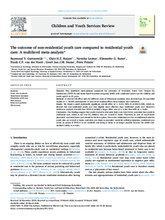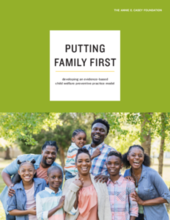This page contains documents and other resources related to children's care in the Americas. Browse resources by region, country, or category.
Displaying 971 - 980 of 3191
This article from NPR accompanies a brief radio segment highlighting the difficulties faced by families with children in foster care during the COVID-19 pandemic, particularly the suspension of in-person visits between parents and their children.
Preliminary findings from studies using abbreviated formats of Parent-Child Interaction Therapy (PCIT) suggest effectiveness of such adaptations in reducing externalizing behavior in foster children and maintaining behavioral improvements several months after the end of the treatment.
This multilevel meta-analysis compared the outcomes of Treatment Foster Care Oregon for Adolescents (TFCO-A) and home-based treatment programs (HBT) with residential youth care for children and youth aged 0 to 23 years.
This paper from the Annie E. Casey Foundation provides guidance for state child welfare agencies on what to consider when developing a preventive practice model that aligns with the requirements of Family First, addresses the unique needs of families within local communities and ensures that selected programs and practices are feasible to implement with quality.
New York City's child welfare agency is “'aggressively' hunting for space to house [foster] youth who are sick or who need to be moved away from ill caretakers," according to this article from the Chronicle of Social Change.
In this webinar, veteran online instructors help identify steps to move online and strategies for adapting the lessons already in motion to this new format.
In this chapter, the authors describe the scale-up and impact of a linked multilevel intervention in a public child welfare system.
In this segment for National Public Radio (NPR), a parent of a child in foster care and several child welfare professionals describe how they are navigating in-person visits, emergency removals and foster placements in the time of the COVD-19 pandemic.
This article from the Chronicle of Social Change offers suggestions for how children in foster care can remain connected with their families during the COVID-19 pandemic when social distancing is required and in-person meetings are not safe to conduct.
This article from the Children's Bureau of the U.S. Administration for Children and Families provides information and resources on the COVID-19 crisis for child welfare workers, children involved in the child welfare system, foster care providers, and more.



